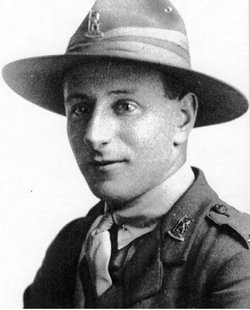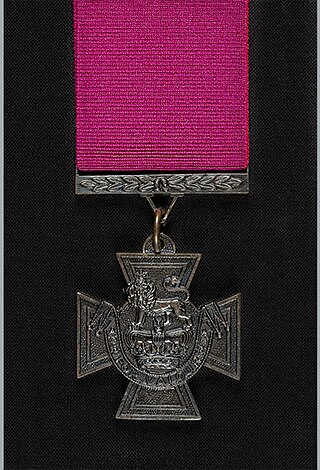
The Most Excellent Order of the British Empire is a British order of chivalry, rewarding contributions to the arts and sciences, work with charitable and welfare organisations, and public service outside the civil service. It was established on 4 June 1917 by King George V and comprises five classes across both civil and military divisions, the most senior two of which make the recipient either a knight if male or dame if female. There is also the related British Empire Medal, whose recipients are affiliated with, but not members of, the order.
The George Cross (GC) is the highest award bestowed by the British government for non-operational gallantry or gallantry not in the presence of an enemy. In the British honours system, the George Cross, since its introduction in 1940, has been equal in stature to the Victoria Cross, the highest military gallantry award. It is awarded "for acts of the greatest heroism or for most conspicuous courage in circumstance of extreme danger", not in the presence of the enemy, to members of the British armed forces and to British civilians. Posthumous awards have been allowed since it was instituted. It was previously awarded to residents of Commonwealth countries, most of which have since established their own honours systems and no longer recommend British honours. It may be awarded to a person of any military rank in any service and to civilians including police, emergency services and merchant seamen. Many of the awards have been personally presented by the British monarch to recipients or, in the case of posthumous awards, to next of kin. The investitures are usually held at Buckingham Palace.

The Distinguished Service Order (DSO) is a military decoration of the United Kingdom, as well as formerly of other parts of the Commonwealth, awarded for operational gallantry for highly successful command and leadership during active operations, typically in actual combat. Since 1993 it has been awarded specifically for "highly successful command and leadership during active operations", with all ranks being eligible.

The Distinguished Conduct Medal was a decoration established in 1854 by Queen Victoria for gallantry in the field by other ranks of the British Army. It is the oldest British award for gallantry and was a second level military decoration, ranking below the Victoria Cross, until it was discontinued in 1993 when it was replaced by the Conspicuous Gallantry Cross. The medal was also awarded to non-commissioned military personnel of other Commonwealth Dominions and Colonies.

The 2nd New Zealand Division, initially the New Zealand Division, was an infantry division of the New Zealand Military Forces during the Second World War. The division was commanded for most of its existence by Lieutenant-General Bernard C. Freyberg. It fought in Greece, Crete, the Western Desert and Italy. In the Western Desert Campaign, the division played a prominent role in the defeat of German and Italian forces in the Second Battle of El Alamein and the British Eighth Army's advance to Tunisia.

The Military Cross (MC) is the third-level military decoration awarded to officers and other ranks of the British Armed Forces, and formerly awarded to officers of other Commonwealth countries.

Cyril Royston Guyton Bassett, VC was a New Zealand recipient of the Victoria Cross (VC), the highest award for gallantry "in the face of the enemy" that could be awarded to British and Empire forces at the time. He was the only soldier serving with the New Zealand Expeditionary Force (NZEF) to be awarded the VC in the Gallipoli Campaign of the First World War.

Harry John Laurent, VC was a New Zealand recipient of the Victoria Cross (VC), the highest award for gallantry in the face of the enemy that can be awarded to British and Commonwealth forces.

The Military Medal (MM) was a military decoration awarded to personnel of the British Army and other arms of the armed forces, and to personnel of other Commonwealth countries, below commissioned rank, for bravery in battle on land. The award was established in 1916, with retrospective application to 1914, and was awarded to other ranks for "acts of gallantry and devotion to duty under fire". The award was discontinued in 1993, when it was replaced by the Military Cross, which was extended to all ranks, while other Commonwealth nations instituted their own award systems in the post war period.
The Victoria Cross for New Zealand (VC) is a military decoration awarded for valour or gallantry in the presence of the enemy to members of the New Zealand Armed Forces. It may be awarded to a person of any rank in any service and civilians under military command, and is presented to the recipient by the governor-general of New Zealand during an investiture held at Government House, Wellington. As the highest award for gallantry in New Zealand it takes precedence over all other postnominals and medals.

The Victoria Cross (VC) is the highest and most prestigious decoration of the British honours system. It is awarded for valour "in the presence of the enemy" to members of the British Armed Forces and may be awarded posthumously. It was previously awarded by countries of the Commonwealth of Nations, most of which have established their own honours systems and no longer recommend British honours. It may be awarded to a person of any military rank in any service and to civilians under military command. No civilian has received the award since 1879. Since the first awards were presented by Queen Victoria in 1857, two thirds of all awards have been personally presented by the British monarch. The investitures are usually held at Buckingham Palace.
This page is based on this
Wikipedia article Text is available under the
CC BY-SA 4.0 license; additional terms may apply.
Images, videos and audio are available under their respective licenses.









